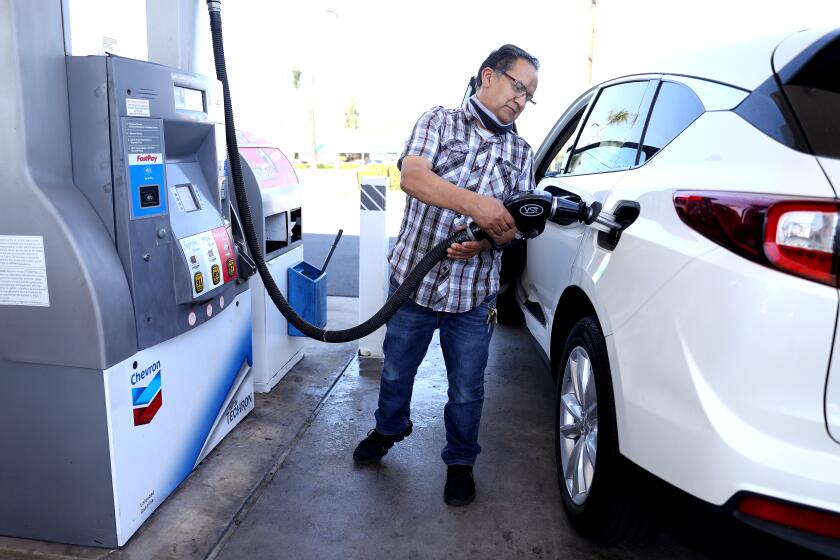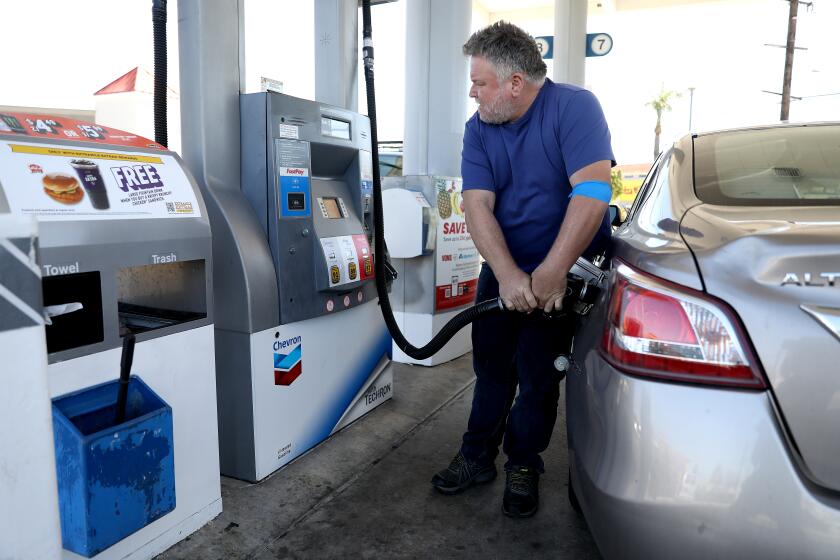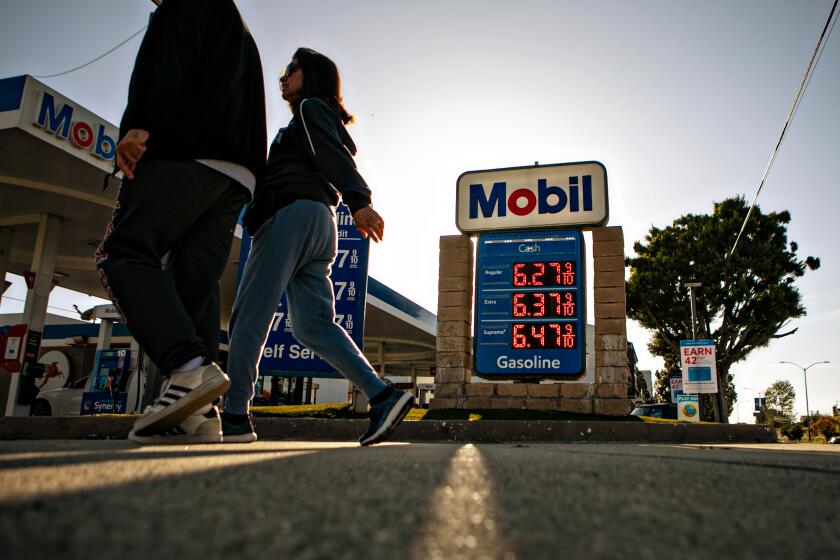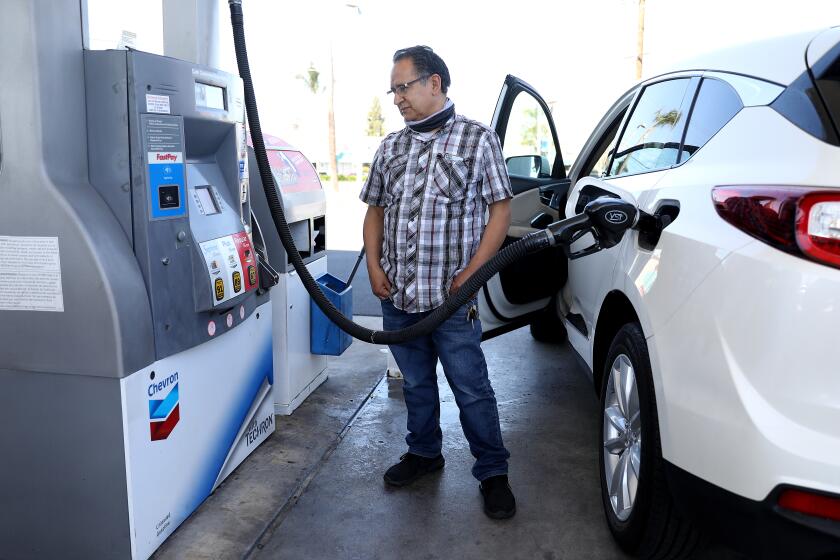Newsom’s gas price relief would send $400 payments to California vehicle owners

Newsom’s $11-billion proposal is designed to offset the rising prices consumers are paying at the pump and also includes savings for those who rely on public transportation.
- Share via
SACRAMENTO — Gov. Gavin Newsom on Wednesday released the long-awaited details of his refund plan to send $400 to Californians for each registered vehicle, a move that would put more money in the pockets of families who own more cars — even the state’s highest-income residents — and exclude those without cars from receiving the payments.
Newsom’s $11-billion proposal is designed to offset the rising prices consumers are paying at the pump and also includes savings for those who rely on public transportation. The plan would include $750 million in grants for free or substantially reduced public transit fare, but Californians who don’t own a registered vehicle would otherwise not receive a refund.
The governor, who is up for reelection this year, would cap payments at $800 for any person with more than one vehicle registered under the person’s name, though households with multiple vehicles registered to different family members could receive far more than that amount.
Newsom said the state is “taking immediate action to get money directly into the pockets of Californians who are facing higher gas prices.”
Average gas prices in California are currently $5.875 per gallon, an increase of more than $1 from one month ago and $2 from one year ago, according to the American Automobile Assn.
The governor’s plan would be subject to approval by the state Legislature and could set him up for a potential battle with leaders of the Senate and Assembly, who introduced their own proposal last week to provide financial relief from the increasing costs of all goods with more money for families.
The plan from Senate President Pro Tem Toni Atkins (D-San Diego) and Assembly Speaker Anthony Rendon (D-Lakewood) centers on a $200 rebate for each taxpayer and dependent, and excludes the top 10% of earners in the state. Their proposal gives money to eligible Californians whether or not they own a vehicle.
“I appreciate Gov. Newsom’s work on developing another option to bring relief to Californians experiencing the rising cost of fuel and consumer goods,” Atkins said. “The Senate is focused on ensuring that state money is targeted to those who actually need relief, and we look forward to working with Gov. Newsom, Speaker Rendon and our Legislative colleagues to quickly develop a proposal that delivers for struggling Californians.”
The governor’s office said Newsom is open to discussing with the Legislature ways to eliminate refunds for high-value cars, but his proposal is currently structured to send payments in the form of $400 debit cards to all vehicle registrants, including motorcycle owners, regardless of income.
The hesitation to tinker with California’s steep gas excise tax of 51 cents per gallon demonstrates just how politically sensitive the issue remains.
Newsom unveiled his plan two weeks after he teased in his State of the State speech that he would put more money back in the pockets of Californians to address higher gasoline costs. An advisor to Newsom told reporters after the speech that the refunds would likely go to vehicle owners. Newsom’s office initially distanced itself from those comments before eventually settling on an approach that ties refunds to drivers.
Environmentalists have argued that connecting refunds to vehicle ownership conflicts with the state’s effort to reduce reliance on fossil fuels and remove cars from the road.
Newsom’s office said his plan will offer the same refunds for electric vehicles and includes a call to accelerate his January budget proposal for more funding for zero-emission vehicles and infrastructure, though that funding is not included in his $11-billion plan.
Alexandra Nagy, California director for Food & Water Watch, called the refund “a Band-Aid for the short term.”
“The only way to bring lasting economic relief to Californians is for Gov. Newsom to initiate a just transition away from fossil fuels immediately,” Nagy said in a statement.
The decision to exclude Californians who don’t own a car from receiving payments also raises questions about equity. Though some families could still save hundreds of dollars on public transit costs, the proposal could disproportionately benefit those with the financial means to own a car or multiple cars.
A new report by the nonpartisan Public Policy Institute of California found that higher-income families buy more gas. But families in the state’s lowest and middle-income brackets spend a larger portion of their budgets on gasoline than high-income families, according to the report.
Californians without cars are more than twice as likely to struggle to meet basic needs, according to an analysis by the California Budget & Policy Center. The poverty rate was 15% for Californians living in households with a vehicle in 2019 compared with 41% among those without a vehicle, according to the analysis.
And while some families cannot afford to own a car, rising gas prices are driving up transportation costs for other goods that are similarly passed along to consumers.
Sen. Scott Wiener (D-San Francisco) said he doesn’t agree with Newsom’s approach.
“If we’re going to provide relief, it should not be based on who owns a car or who doesn’t own a car, and it should be targeted to the people who actually would really benefit from the help,” he said.
Wiener said a more targeted refund to struggling Californians would reduce the overall cost to the state and allow lawmakers to invest more money into fixing dilapidated school buildings, expanding access to clean water, responding to sea level rise, reducing wildfire risk and addressing other important infrastructure needs.
Advocacy groups that have similarly pushed for financial relief to be targeted to the lowest-income Californians were stunned by Newsom’s proposal, saying the state’s surplus should not go to the ultra-wealthy.
“It’s mostly terrible, to be completely honest,” said Chris Hoene, executive director of the California Budget & Policy Center. “It doesn’t get the bulk of the aid into the hands of those who need it most, and it’s wasting state resources to provide a credit to a whole bunch of Californians who are upper income and don’t need this kind of support right now.”
Jhumpa Bhattacharya, a vice president at the Insight Center for Community Economic Development based in Oakland, called the proposal misguided and said it does not take into account California’s vast wealth gap. Any solution should “avoid universality,” she said, pointing to wealth gaps based on race.
“While it’s true that all Californians are feeling a sting at the pump, for some it’s a matter of making a choice between keeping food on the table or filling their car, while for others it’s an inconvenience, but one they can shoulder,” Bhattacharya said. “You can’t tell me that a household making $150,000 is feeling the same level of anxiety about gas prices as one that is making $38,000.”
Meanwhile, the Service Employees International Union California called Newsom’s plan “welcome news to front-line workers” but encouraged him to focus on “lower- and middle-income Californians and essential workers forced to choose between filling up our tank or going hungry.”
Rendon has also been adamant that he would not support any plan to provide refunds to the state’s highest-income taxpayers.
The proposal comes as pressure mounts to help Californians struggling with prices at the pump, as well as increases in the costs of food, rent and other daily essentials.
“A lot of people have suffered recently,” Rendon told The Times last week. “A lot of Californians have been struggling, and we’re looking for a solution to provide financial support for those Californians in particular.”
The speaker’s comments came in response to a proposal led by a group of mostly moderate Democrats in his caucus and one independent to provide a $400 rebate to every Californian regardless of income level.
The lawmakers said the $400 sum would cover the current 51 cents-per-gallon gas tax for one full year calculated on one trip to the pump per week for most vehicles.
That plan would cost the state $9.2 billion, according to a cost comparison by advisors to the legislative leaders. The price tag of Atkins and Rendon’s proposal would likely hit $6.8 billion.
Newsom’s proposal is expected to cost the most at $11 billion, which includes $9 billion in tax refunds to drivers, $750 million for public transit grants, $600 million to pause the sales tax on diesel for one year and $523 million to pause inflation increases to gas and diesel excise taxes.
In January, Newsom proposed pausing a gas tax increase for a year slated to take effect in July, which legislative estimates suggest could amount to about $15 in savings per driver.
That question is at the center of ongoing discussions inside the state Capitol as California grapples with a surge in gasoline costs and is projected to have a record-high budget and surplus.
Though supported by some Republicans, many Democratic lawmakers pushed back on the idea, saying it could reduce necessary funding for transportation projects. Newsom’s proposal unveiled Wednesday continues to embrace the idea.
The various efforts to defray the rising cost of gasoline come in the middle of an election year and at a time when inflation and interest rates are on the rise, elevating fears about the economic future and financial pressures on people in California and nationwide. All of the proposals to provide a cash supplement to millions of Californians rely on using a portion of the state’s surplus tax revenues.
Newsom’s fiscal advisors and independent analysts have projected the state will have some $30 billion in excess cash by early next summer. That estimate will be updated in May, when the governor sends legislators a revised budget plan — one based on the income tax filings of Californians made by April 15. And it’s possible the state’s budget surplus could be even larger than the early projections.
The governor’s office said Newsom hopes to reach an agreement with lawmakers on details of the refund before he unveils his revised budget plan in May, a timeline that would allow early action on his proposal. The debit card refunds could go out to consumers two to three months after approval.
Sacramento bureau chief John Myers contributed to this report.
Gas prices are high across California, and it’s unclear when prices will go down. But, there are ways to save money on gas. Here are some tips.
More to Read
Sign up for Essential California
The most important California stories and recommendations in your inbox every morning.
You may occasionally receive promotional content from the Los Angeles Times.
















